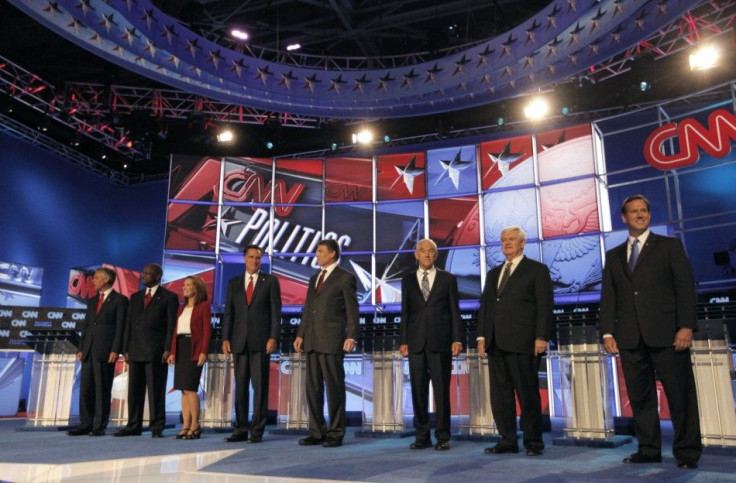Rick Perry Comes Under Fire Over HPV Vaccine

In a heated debate among Republican presidential candidates Monday, Texas Gov. Rick Perry was caught in the crossfire over his 2007 executive order that required Texas schoolgirls to receive vaccinations against the sexually transmitted HPV virus.
The debate, which aired on CNN, saw Minnesota Rep. Michele Bachmann lash out at Perry over the contentious vaccine issue.
To have innocent little 12-year-old girls be forced to have a government injection through an executive order is just flat out wrong, she said.
She also pointed out that Merck and Co., which produced the vaccine, employed Mike Toomey, Perry's former chief of staff, as a lobbyist in Texas, and that the drug company had donated to Perry's campaigns, reports the Associated Press.
On Feb. 2, 2007, Perry issued an executive order requiring that Texas girls receive the HPV vaccine, which protects against some strains of the human papilloma virus, a contributing factor to some forms of cervical cancer. The order provided vaccination free of charge to those who were not covered by insurance and included an opt-out provision for parents. At the time of the order, Gardasil, a newly approved drug manufactured by Merck, was the only HPV vaccine approved by the Food and Drug Administration.
Perry's decision drew a lot of flak from social conservatives, who objected to forcible inoculations against a disease spread by sexual activity. In May 2007, the Texas Legislature passed a bill to undo Perry's executive order, as they believed the measure tacitly approved premarital sex, according to the Associated Press report. Perry did not veto it, saying the Legislature would have sufficient time and votes to override his veto.
At the debate. Perry defended his stance by saying that he had always been pro-life and wanted to stop a cancer. Perry admitted that he would have acted differently if he could do it all over again, saying that he would have worked with the legislature instead of issuing an executive order. However, he held his ground that girls should be vaccinated against the virus and pointed out that the order wasn't a mandate and parents had the right to opt out.
Other candidates also assailed Perry over the issue. Rick Santorum, a social conservative, said that this disease is spread through sexual contact and unless 11- and 12-year-olds in the state of Texas are somehow encouraged to participate in that activity, this is not something that the state or federal government should be doing, the former Pennsylvania senator said on the Fox News channel.
Bachmann criticized Perry on NBC's Today show on Tuesday saying that crony capitalism could likely have been the cause of Perry's executive order.
During the CNN debate, Bachmann questioned Perry's connection with Merck, which produced the vaccine at the time. Merck stood to gain financially from Perry's order.
It was a $5,000 contribution that I had received from them, Perry said. I raise about $30 million. And if you're saying that I can be bought for $5,000, I'm offended.
However, according to a Washington Post report, Perry's financial connection with Merck goes much deeper.
Perry's gubernatorial campaigns have received nearly $30,000 from the drugmaker since 2000, most of that before he issued his order, stated the report.
The company also donated money to a national organization called Women in Government, which was led by state Rep. Dianne White Delisi in Texas, who chaired the House public health committee and was also the mother-in-law of Perry's chief of staff at the time.
A review of the campaign finance reports shows that Merck's political action committee continued to contribute a total of $17,500 to Perry's campaign fund between 2008 and 2010 even though Perry's order was eventually overturned, reports AP.
Bachmann said on NBC that the HPV vaccine could have very dangerous side effects, including mental retardation. This was, however, denied by the American Academics of Pediatrics, which said that Bachmann's claim had absolutely no scientific validity.
Since the vaccine has been introduced, more than 35 million doses have been administered, and it has an excellent safety record, the academy said.
The Associated Press report says that many experts recommend that parents get their children vaccinated, with girls starting the shots at 11 or 12, an age set so that most girls would have the full series completed well before they become sexually active - although the shots can be given up to age 26.
In 2006, 41 state legislatures and the District of Columbia have introduced laws related to promoting or requiring insurance coverage for the HPV vaccination, but only Virginia and the District of Columbia have laws requiring it, added the report.
© Copyright IBTimes 2024. All rights reserved.





















